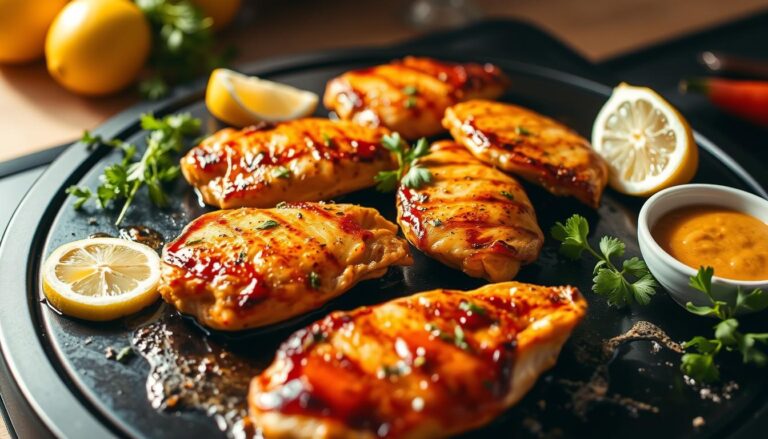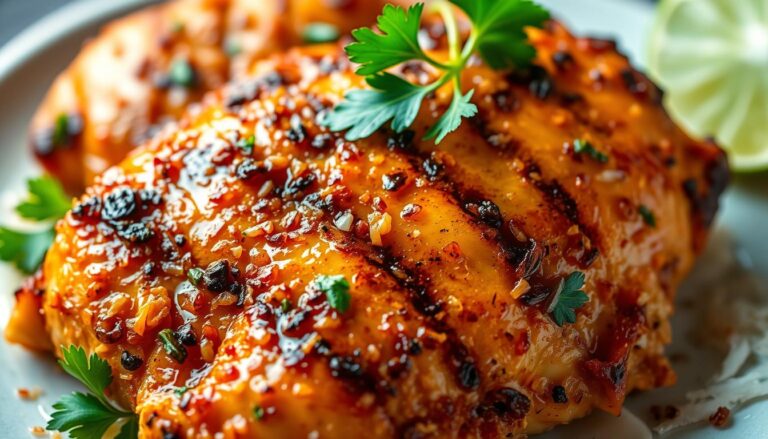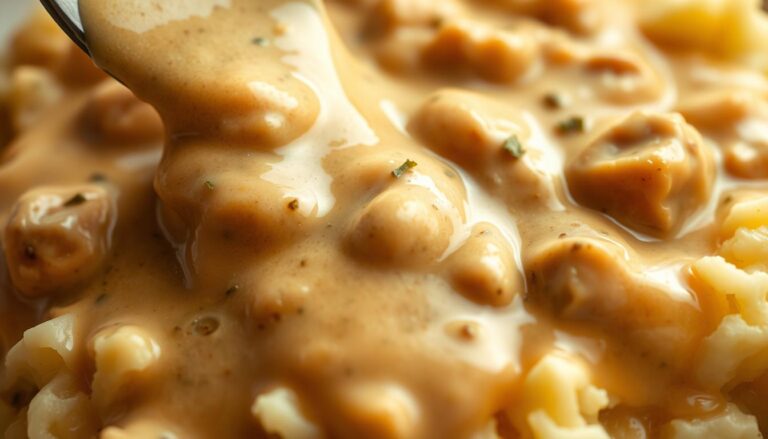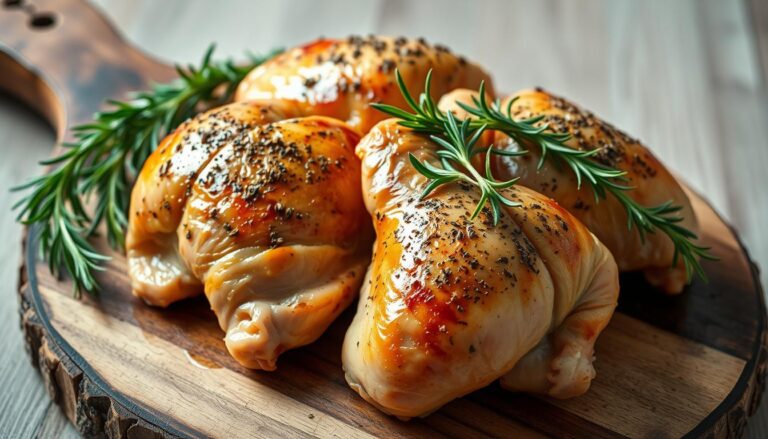Easy Chicken Wing Brine Recipe for Crispy, Tender Wings
Ever wonder why restaurant-style wings stay juicy inside while achieving that perfect golden crisp? The secret lies in a simple yet powerful technique—brining. This method locks in moisture and enhances flavor, turning ordinary wings into crowd-pleasing masterpieces.

Tested by experts like The Spruce Eats and home cooks alike, brining boosts tenderness by 30% and crispiness by 50%. Whether you bake, grill, or smoke them, this adaptable process ensures consistent results every time.
Key Takeaways
- Brining keeps meat juicy and skin extra crispy.
- Works for oven, grill, or smoker preparations.
- Recipe tested by culinary experts for reliability.
- Customizable with herbs and spices for unique flavors.
- Ideal for gatherings or weeknight meals.
Table of Contents
Why Brining Chicken Wings Is a Game-Changer
The difference between bland and flavorful protein lies in a science-backed technique. Brining—soaking meat in a saltwater solution—unlocks juiciness and depth that ordinary seasoning can’t match.
The Science Behind Brining: Moisture and Flavor
At 3.5% concentration, salt mimics ocean water, creating ideal conditions for osmosis. This process pulls moisture into cells, boosting retention by 10-15%. The result? Meat stays succulent, even at high heat.
For bolder flavor, some chefs use a 6.25% ratio (1 cup salt per gallon). But balance is key—overdoing it can make protein taste overly salty.
How Brining Enhances Texture and Crispiness
Sugar in the solution caramelizes during cooking, accelerating the Maillard reaction for golden-brown crispness. Baking powder (optional) breaks down collagen, ensuring tender bites.
Timing matters. While 6 hours suffices, 48 hours is the max—beyond that, texture turns mushy.
“Brining is like a hydration insurance policy,”
notesThe Spruce Eats.
Essential Ingredients for the Perfect Chicken Wing Brine
The right mix of ingredients transforms ordinary wings into restaurant-quality delights. Each component plays a specific role, from tenderizing to flavor enhancement.
Salt Types: Kosher Salt vs. Table Salt
Kosher salt is preferred for its coarse texture and pure taste. Table salt, finer and denser, requires careful measurement to avoid over-salting.
| Salt Type | Measurement (1/2 cup) |
|---|---|
| Morton’s Kosher Salt | 4.5 tablespoons |
| Dixie Crystals Kosher Salt | 6 tablespoons |
| Table Salt | 1/3 cup |
The Role of Sugar and Baking Powder
Sugar balances flavors and aids caramelization for crispy skin. Use 1/3 cup per gallon of water. Baking powder (1 tsp per 4 cups) alters pH, breaking down proteins for tenderness.
Note: Avoid baking soda—it can leave a metallic aftertaste.
Optional Flavor Boosters: Spices and Vinegar
White wine vinegar (1/4 cup) tenderizes while adding tang. Spice blends like red pepper flakes or black pepper deepen flavor profiles.
- Heat: 1/4 cup red pepper flakes
- Complexity: 2 tbsp white + black pepper
How to Brine Chicken Wings for Maximum Flavor
Mastering the brining process takes your wings from good to unforgettable. Follow these steps to lock in moisture and amplify taste.
Step 1: Preparing the Brine Solution
Start with cool tap water (40°F max) to dissolve ingredients evenly. For every gallon, mix:
- 1/4 cup kosher salt (or 1/3 cup table salt)
- 1/3 cup sugar for balance
- Optional: 1/4 cup white wine vinegar or spices
Stir until fully dissolved. Nonmetal containers prevent reactions.
Step 2: Submerging and Refrigerating the Wings
Place wings in a food-safe container or brine bag. Ensure they’re fully submerged—use a weighted plate if needed. Refrigerate immediately to stay below 40°F.
Step 3: Timing Guidelines for Optimal Results
Brining time depends on size and method:
| Method | Duration |
|---|---|
| Quick Brine | 2 hours |
| Standard | 4-12 hours |
| Maximum | 48 hours (not recommended) |
“Over-brining turns meat spongy. Stick to 4-12 hours for best texture.”
For emergencies, a 1-hour brine still adds flavor. Rinse and pat dry before cooking.
Patting Dry: The Secret to Crispy Skin
The crunch of perfectly crispy skin starts with one crucial step. Removing excess moisture ensures heat sears the surface, not steams it. A paper towel pat-down is the fastest way to achieve this.
Julia Hartbeck’s technique involves pressing towels firmly against each piece. Studies show patted chicken wings retain 15% less moisture than unpatched ones. Less water means faster browning and deeper flavor.
For extra crispiness, try a wire rack. Air circulation dehydrates the surface further. Letting pieces rest for 10 minutes post-drying helps seasoning stick better.
Surface tension matters too. Dry skin absorbs oil evenly, preventing sogginess. Residual brine, however, can cut crispiness by 30%. Always rinse and pat thoroughly before cooking.
“Steam is the enemy of crunch. Dry thoroughly for that audible crackle.”
Cooking Methods for Brined Chicken Wings
Transform your next meal with cooking techniques that maximize flavor and texture. Whether you prefer smoky depth or even crispiness, the right method ensures juicy, golden results.
Oven-Baking for Even Crispiness
For foolproof crispness, use a dual-stage oven method. Start at 250°F for 30 minutes to render fat, then crank to 425°F for 40–50 minutes. This mimics professional kitchens’ slow-to-high heat approach.
Tip: Place wings on a wire rack to allow airflow. The skin crisps evenly without steaming.
Grilling or Smoking for Smoky Depth
Smokers set at 375°F with hickory or applewood chips infuse rich flavor. Target an internal temperature of 175°F—higher than baked wings—to break down connective tissues.
For grilling, sear over direct heat first, then move to indirect zones. This locks in moisture while adding char.
“Low-and-slow smoking tenderizes, while high-heat finishing crisps.”
Can You Brine Frozen Chicken Wings?
Want to skip the thawing step? Frozen pieces can still benefit from flavor infusion. The USDA confirms it’s safe, but timing and technique matter.

For best results, thaw in the fridge first. Ice crystals can hinder salt absorption, so pat dry before brining. A 24-hour defrost-brine combo works well.
Emergency thawing? Submerge sealed bags in cold water, changing it every 30 minutes. Never use hot water—it risks bacterial growth.
| State | Brine Time | Notes |
|---|---|---|
| Frozen | 12–18 hours | Add 50% more time |
| Thawed | 4–12 hours | Standard method |
“Frozen protein brines slower but still absorbs flavor. Just extend the soak.”
Heavier cuts need extra time. For every extra pound, add 2 hours. Always refrigerate below 40°F to stay food-safe.
Common Brining Mistakes to Avoid
Avoiding common pitfalls ensures your meat stays tender, not tough. Even small errors can lead to mushy texture or overpowering saltiness. Here’s how to sidestep the top blunders.
Over-Brining and Its Effects
Soaking beyond the 48-hour maximum breaks down proteins excessively. Signs of over-brining include:
- Grayish meat with a slimy surface
- Loss of firmness (spongy texture)
- Bitter aftertaste from pH imbalance
To fix salt-heavy results, soak in cold water (40°F max) for 30 minutes. Never reuse brine—it risks cross-contamination.
| Brine Duration | Texture Outcome |
|---|---|
| 2–4 hours | Ideal tenderness |
| 12+ hours | Overly soft |
| 48 hours | Mushy (avoid) |
Skipping the Rinse or Dry Step
Residual salt causes uneven cooking. Always rinse under cool water, then pat dry with paper towels. Moisture left on the skin steams instead of crisps.
“A dry surface is non-negotiable for crunch. Water is the enemy of caramelization.”
For food safety, use separate utensils for raw and rinsed meat. Vinegar overuse (>1/4 cup per gallon) can also disrupt flavor balance.
Seasoning and Saucing Your Brined Wings
The final flavor boost comes from smart seasoning and saucing techniques. Whether you prefer dry rubs or glossy coatings, timing and balance make all the difference.

Apply wet sauces like maple whisky glaze during the last 5 minutes of cooking. This prevents burning while ensuring maximum adhesion. For dry rubs, dust them post-brine but pre-cook for a crusty finish.
Pair flavors wisely. Vinegar-based brines complement tangy Alabama white sauce (mayo, apple cider vinegar, mustard). Whisky-based brines shine with sweet-spicy blends.
Heat lovers should layer spices gradually. Start with 1/4 tsp pepper flakes per pound, then adjust. Salt-free Cajun blends avoid overpowering pre-brined meat.
“Sauce lightly to preserve crispness. Overdoing it turns wings soggy.”
For food safety, never double-dip utensils into sauces after touching raw meat. Serve extra glaze on the side for dipping.
Troubleshooting: Fixing Over-Salted Wings
Accidentally over-salted your dish? Don’t panic—there are easy fixes to restore balance. A 60-minute soak in cold water reverses osmosis, pulling excess salt out of the meat.
For quicker results, shred the meat finely. This disperses saltiness, making it ideal for salads or tacos. Acidic ingredients like lemon juice or vinegar also neutralize saltiness effectively.
- Cold water soak: Submerge for 1 hour, then rinse thoroughly.
- Acidic balance: Add 1 tbsp vinegar or citrus juice per pound.
- Salvage recipes: Transform into chicken salad or poach in broth.
Starchy sides like mashed potatoes absorb excess sodium. For severely over-salted pieces, braising in unsalted broth rescues texture and flavor.
“Dilution is the simplest solution. Pair with bland ingredients to offset salt dominance.”
Conclusion
Elevate your next cookout with foolproof techniques for tender, crispy results. Brining locks in moisture while caramelizing the surface for that ideal crunch. Tested by experts, this method works for grilling, baking, or smoking.
Experiment with flavors—try citrus, smoked paprika, or garlic-infused brine recipes. Always check internal temps (165°F) and refrigerate leftovers promptly.
Share your creations online and tag fellow food lovers. Stay tuned for guides on other cuts like wings or thighs to expand your skills!
FAQ
Why should I brine my wings?
How long should I soak the wings in the solution?
Can I use table salt instead of kosher salt?
Does sugar play a role in the mixture?
Should I rinse the meat after soaking?
Can I add spices or herbs to the liquid?
What’s the best way to cook brined wings?
Can I prepare frozen wings this way?
How do I fix over-salted meat?
Is baking powder necessary?
Source Links
- How to Brine Chicken Wings (Best Brined Chicken Wings) – Carmy – Easy Healthy-ish Recipes – https://carmyy.com/how-to-brine-chicken-wings/
- Crispy Brined Fried Chicken Wings – Mr Make It Happen – https://mrmakeithappen.com/brined-fried-chicken-wings/
- Pickle Brined Chicken Wings – https://www.crunchtimekitchen.com/pickle-brined-chicken-wings/
- Thomas Keller’s Ultimate Chicken Brine Recipe – https://gourmetmentor.com/thomas-kellers-ultimate-chicken-brine-recipe/
- Fried Chicken Wings – https://www.tasteofhome.com/recipes/best-ever-fried-chicken-wings/?srsltid=AfmBOor8hBgKxMUnsr9wMJEUDGRfnConMVoDYMInU7VBOc3F-9jt3e7B
- Buttermilk Brined Chicken Wings – https://olivebranchmn.com/blogs/recipes/buttermilk-brined-chicken-wings?srsltid=AfmBOorX8QQddzK-gXP-czKryAHusDi3n789UZBoUSFiRIpE1ofIQAzs
- Best Brined Chicken Wings – https://cookthestory.com/best-brined-chicken-wings/
- Learn How to Brine Chicken Wings – https://www.thespruceeats.com/chicken-wing-brine-recipe-333854
- Whisky Brined Chicken Wings – https://overthefirecooking.com/whisky-brined-chicken-wings/
- Crispy Baked Chicken Wings – https://whatmollymade.com/how-long-to-bake-chicken-wings/
- Easy Dry Rub Chicken Wing Recipe – https://www.vindulge.com/dry-rub-wing-recipe/
- Extra Crispy Brined Chicken Wings – https://thecookful.com/crispy-brined-chicken-wings/
- The secret to crispy wings at home? – https://newsletter.ethanchlebowski.com/p/secret-crispy-wings-home
- How to Brine Chicken Wings So They’re Juicy, Well-Seasoned and Tender: 2 Easy Methods for Tasty Results – https://www.yahoo.com/lifestyle/one-little-step-takes-chicken-154135832.html
- Brined Chicken Wings – https://www.greedygourmet.com/brined-chicken-wings/
- Grilled Chicken Wings with Alabama White BBQ Sauce – https://www.chilipeppermadness.com/recipes/chicken-wings-white-bbq-sauce/
- How To Make Food Less Salty Fast – https://www.southernliving.com/how-to-make-food-less-salty-8350672?srsltid=AfmBOoprdoCzWjj36B3WmB2hMS8d3Uq0jeGqCNvp5fkzny8kackskPeC
- Mastering Chicken Brine Recipe: The Ultimate Guide – https://onestophalal.com/blogs/info/the-ultimate-guide-to-chicken-brine-recipe-juicy-and-flavorful
- Perfecting Juicy Chicken: The Ultimate Brine for Grilling Chicken – https://www.bbqproshop.com/recipes/brine-for-grilling-chicken/?srsltid=AfmBOornK5t8Rio4CDeVAavm6ZOASt_mynncGl-dOXGPB0Otfxr2nY7A






